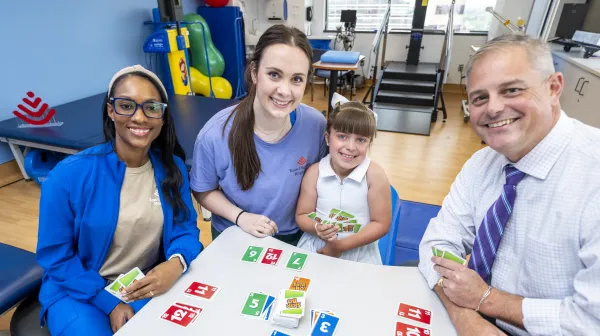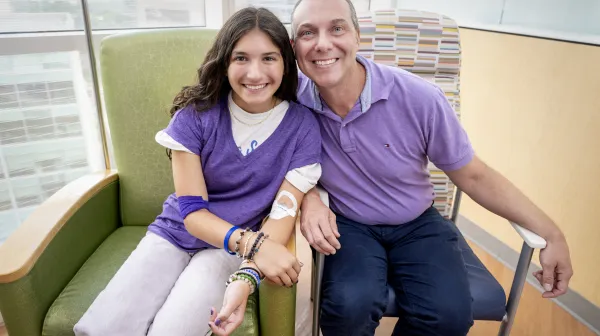Bailey and Kellen Gordon are the parents of 2-year-old twin girls, Willa and Hazel. Only weeks after the twins’ first birthday, the Gordons were thrilled to find out their family would be growing once again.
“Once we shared this exciting news with our family and friends, everyone told us, ‘It’s just one baby this time around, and it will be a lot easier than your twin pregnancy,’ Bailey said. “Well, they jinxed me because this was anything but an easy pregnancy. Early on in my pregnancy, we already had the name picked out. My husband and I had just watched Die Hard starring Bruce Willis and we loved his character’s name, John McClane. So, we decided to name our baby, McLane.”
On Jan. 6, 2021, because of COVID-19 restrictions still in place, Bailey went to McLane’s 20-week ultrasound appointment alone. As she watched her baby on the big monitor, everything was going well until the ultrasound technician had trouble viewing the baby’s spine. Bailey didn’t think much of it but remembered noting that it was weird of the technician to mention that, but she was too shocked about the news that they were having a boy!
“At the time, I didn’t think it was a huge concern, so I wasn’t really worried,” Bailey said. “I went home and surprised my husband with the exciting baby boy news! The next morning, I got a follow-up call from my OB/GYN. She told me they found something concerning on the ultrasound. My baby had a lemon-shaped head, which indicated fluid build-up in the brain. She said, ‘I hate to do this over the phone, but I’m not going to be your doctor anymore. I am referring you to a high-risk maternal fetal medicine physician. I can’t go into anymore detail. You need to see the high-risk OB/GYN and he will give you the diagnosis.’”
In their hometown of Auburn, Washington, Bailey and her husband met with the MFM physician who informed them their son had spina bifida, a birth defect that occurs when the spine and spinal cord don't form properly. After their physician discussed various treatment options with them, the Gordons were eager to learn more about fetoscopic surgery and the next steps if they decided to pursue this route.
“We wanted to do what was best for our son, and we learned very few fetal centers in the country perform fetoscopic spina bifida repair surgery,” Bailey said. “My doctor gave us four centers to consider. Since I was 21-weeks pregnant, we only had a few weeks to make our decision since this type of fetoscopic repair surgery is usually performed no later than 26 weeks. While we got a lot of support from our family, it wasn’t until I posted our story on my Instagram account that I reconnected with a college friend whose baby was diagnosed with spina bifida and recently had in-utero repair surgery at Texas Children’s Fetal Center. I was so surprised because Texas Children’s wasn’t on the list of centers that my doctor gave me. My friend told me that two surgeons from Texas Children’s pioneered this procedure. She encouraged me to reach out to Texas Children’s to schedule a consultation to see if we qualified for this fetal surgery.”
On Jan. 23, 2021, Bailey – now 23-weeks pregnant at the time – and her husband traveled from Seattle to Houston where they met with the Fetal Center team. The next three days were filled with numerous appointments and screening tests to evaluate if Bailey and McLane were candidates for in-utero surgery. A few days later, Bailey received the news she’d been hoping for – she and her son were able to get this procedure.
“This was the best news ever,” Bailey said. “I knew that repairing our son’s spina bifida prior to birth was important to help improve his long-term outcomes. Our surgery was scheduled for Feb. 10, 2021. My husband and I flew back to Seattle to gather our belongings to relocate to Texas for the next three months. My mom, mother-in-law, and father-in-law brought our daughters down to join us in Houston two weeks after surgery. We ended up renting a home for a few months since I needed to be closer to the hospital after the fetoscopic surgery so they could evaluate McLane and I.”
On Feb. 10, Texas Children’s Obstetrician and Gynecologist-in-Chief, Dr. Michael Belfort, and pediatric neurosurgeon, Dr. William Whitehead, performed McLane’s in-utero spina bifida surgery at 25 weeks. On March 3, 2021, at 28 weeks, Bailey began showing signs of chorioamniotic membrane separation at her routine post-op ultrasound. She was admitted that day to Texas Children’s Pavilion for Women® for the remainder of her pregnancy so her maternal-fetal medicine team could monitor her condition more closely. She spent six weeks in the hospital. On April 13, 2021, Bailey and Kellen welcomed their son, McLane, into their family. He was born at 34-weeks via C-section. He spent eight days in the neonatal intensive care unit before Willa and Hazel finally got a chance to meet their little brother.
“We’re so thankful to our physicians and nurses who took great care of us at Texas Children’s,” Bailey said. “Prior to my son’s fetal surgery, the entire team spent many hours prepping us for what the surgery would be like, but the most informational meeting was with the anesthesiologist, Dr. David Mann, who was not only very informative but made me feel comfortable and explained the procedure to me in detail in order to help me better understand what to expect on surgery day. I am grateful to Dr. Belfort and Dr. Whitehead for performing my son’s fetal surgery to repair spina bifida. I had wonderful physicians including Dr. Nassr, Dr. Donepudi, Dr. Espinoza and Dr. Magdalena Sanz-Cortes (she and Dr. Krispin delivered McLane), who I communicated with often during my pregnancy. And of course, I can’t forget my amazing nurses. All of the nurses very so supportive during my 6-week stay, especially since I could only see my twin girls two hours a week due to COVID-19 visitor restrictions, which was extremely hard for me. At one point, I wanted to speak with someone for mental health support. Realizing how important that was to me, a nurse arranged a meeting with one of the chaplains who came to my room until I could get time with a therapist. Everyone, from the housekeepers and the dining service delivery to the nursing staff and doctors, were incredible.”
A few weeks after McLane was born, the family returned to their home in Washington. Today, 5-month-old McLane is doing well – and continues to see his physicians for follow-up appointments. Although he isn’t showing major symptoms of hydrocephalus, the Gordons say their son will most likely need a shunt. Since his head size has stabilized, his doctors feel comfortable waiting and continuing to monitor his head growth.
“I am so glad I came to Texas Children’s,” Bailey said. “For those families going through a spina bifida diagnosis, the situation can be challenging, but it is not hopeless. As parents, you are doing the best you can for your baby. Have faith in your decision and ask questions. There are many spina bifida and fetal surgery support groups on social media. These groups gave me strength and hope during this journey.”
Texas Children’s Fetal Center is among the nation's leaders in providing high-risk maternal care and the diagnosis and treatment of abnormalities in unborn and newborn infants. Click here to learn more about our Fetal Center and the fetoscopic spina bifida surgery pioneered at Texas Children’s by Obstetrician and Gynecologist-in-Chief, Dr. Michael Belfort, and Pediatric Neurosurgeon, Dr. William Whitehead.



